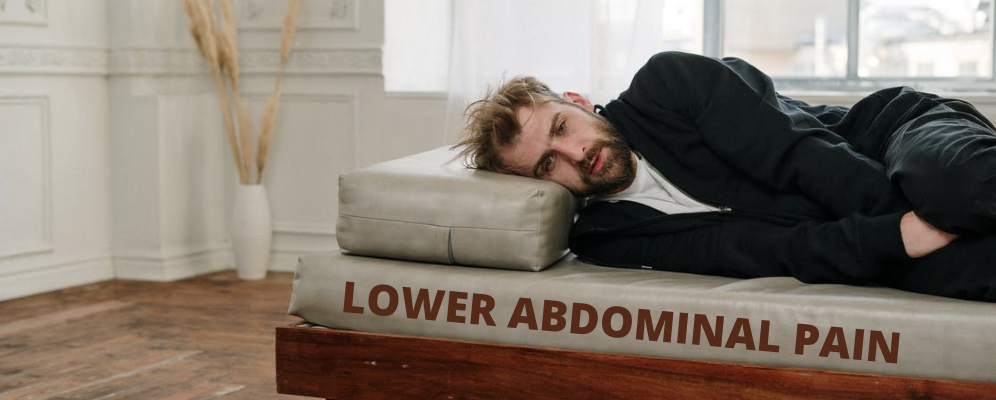
Overview:
Just about everyone experiences abdominal pain at some point in life. Most of the time, it is not severe and resolves by itself. However, it can be a symptom of severe illness or even an emergency. Abdominal pain may cause about 5% of emergency room visits.
Abdominal pain has many reasons; some are more severe than others. What feels like a stomach ache may come from another organ in your lower abdomen or outside the digestive system. Always seek medical if your abdominal pain is severe, persistent, and abdominal.
Abdominal pain is discomfort anywhere in the belly region between your pelvis and ribs. We often think of lower abdominal pain as stomach pain, but the pain in the abdomen can come from another organ also.
What is lower abdominal pain?
Lower abdominal pain or pelvic pain is referred to the discomfort that occurs at or below the belly button. Organs in your pelvis, including reproductive organs and bladder, are often where pelvic pain occurs. These problems are relatively common in males. According to the Institute of Diabetes and Digestive and Kidney disease estimate that chronic pelvic pain syndrome affects about 10 to 15 percent of the population of the USA.
Lower abdominal pain often occurs with other symptoms. Treatments may vary depending on the causes, so it is necessary to receive a thorough checkup in each case. It has many reasons, some more severe than others. What feels like a stomach ache may be coming from another organ in your abdomen or from outside of your digestive system. Always seek emergency medical help if your abdominal pain is unexplained, persistent, or severe.
An abdomen is your home to the stomach, gallbladder, liver, pancreas, large intestine, and small intestine. These all are organs in your digestive system, but aches can also be in your abdominal wall, the outer shell of your abdomen. Sometimes, the discomfort in your belly may be coming from somewhere else, such as the back, chest, and pelvic. This ache can take many forms and can mean many things such as:
- dull or sharp
- mild or severe
- crampy and colicky
- constant and intermittent
- localized or generalized
- burning or achy
Ultimately, the lower abdominal pain is a personal sign that only you can describe. Since your medical professional can not measure it, that is what you say it is. Your medical professional will always take your abdominal pain seriously.
What are the common types of abdominal pain?
Since the abdomen is home to many organs, your medical professional may want to narrow down the type of pain you are suffering by narrowing down the region you are feeling it. A medical professional often divides the abdomen into quadrants or four parts. They may also ask if your pain is in the:
- left lower quadrant
- right lower quadrant
- left upper quadrant
- left upper quadrant
Location is an essential clue to your abdominal pain, though it is not the only factor. It may indicate a problem is involved. For instance, pain in the upper right quadrant may indicate a problem with your gallbladder and liver. However, your medical professional will also want to know more about your pain, how often you think it, and how severe it is. It will give them additional clues about what kind of conditions you may have.
What are the common causes of abdominal pain?
There are many possible reasons for male pelvic pain. It is necessary to note other symptoms, which may help you determine the cause.
Cystitis
Cystitis, also referred to as inflammation of the bladder, is usually caused due by a UTI. But it can be usually caused due to several factors, such as:
- reaction to chemicals in products
- reaction to medicine
- long-term catheter use
- radiation treatment
Cystitis pain appears in your pelvic area. Other symptoms may include:
- bloody urine
- cloudy, dark, or smelly urine
- frequent urge to urinate
- painful or burning urination
Urinary tract infection
This tract produces urine and removes it from the body. It consists of the ureters, urethra, bladder, kidneys, or ureters. A urinary tract infection happens when bacteria overgrow in any of these parts. Most of these tracts cause bladder inflammation. UTI symptoms may include pelvic pain, along with:
- frequent urge to urinate
- pelvic pressure
- painful urination
- bloody urination
What are causes lower right abdominal pain in males?
These causes are the most common cause you may suffer from some ache on either side of the lower abdomen. Although you can feel pain on the right side of the abdomen, this ache can also occur on your left.
Gas
Intestinal gas is the air found in your entire digestive tract. It is often occurred by food that is not broken down completely until it reaches your colon. The more undigested food is present, the more gas body will produce. As gas builds up, it can cause lower abdominal pain and a knotted feeling in the stomach. Farting and burping usually provide relief. In fact, it is generally for an individual to expel gas about 20 times per day.
However, excessive gastric may be a symptom of a digestive disorder, including lactose intolerance and diabetes.
Hernia
It happens when your body part or internal organ pushes through tissue and muscle that holds it in a place. There are various types of hernias, most of which happens in the abdomen. Each type can cause discomfort and pain in the affected area. Other common symptoms may include:
- increased pain
- swelling or bulging at the site
- a dull ache
- feeling full or constipated
- pain while laughing, lifting, coughing, crying, and straining
Kidney stones
It is a hard buildup of minerals and salts that form inside your kidney. You may feel any ache until the kidney stones start moving around or pass into the tube that connects to your kidney and bladder. You may feel serious pain in your lower abdomen and groin when it happens. The location and intensity of the pain may change as the kidney stone shifts and moves through your urinary tract.
Other signs may include:
- nausea
- urine that is cloudy and smells bad
- pink, red, or brown urine
- feeling the constant need to pee
- vomiting
- frequent urination
What causes lower left abdominal pain?
The left side of the abdomen is home to the last part of your colon and, for some, the left ovary in those who have them. Mild pain in this area is generally nothing to worry about. It may clear up on its own in a day or so. Suppose you have pain related to an accident or injury. Also, seek immediate medical help if you feel pressure and pain in your chest. Ask for immediate help if you have:
- swelling of the abdomen
- fever
- severe tenderness in the affected area
- unexplained weight loss
- persistent nausea and vomiting
In many cases, persistent pain specific to the lower left side of the abdomen is caused due to diverticulitis. It is a small pouch created from the pressure on a weak spot in the colon. Diverticula is common and even more so after age 50. When a pouch tear, infection, and swelling can cause diverticulitis
Other symptoms may include:
- nausea
- vomiting
- nausea
- abdominal tenderness
Less commonly, diarrhea and constipation can be a symptom of this condition.
When can I seek a medical professional?
Always consult a medical professional if your pain is unexplained, severe, persistent, or if you have been pregnant and injured. Also, consult them if any of these signs accompany your pain:
- blood in your stools
- urine and vomit
- jaundice
- pain in any part of the body
- shortness of breath
- symptoms that get worse with exertion
- pain in any part of the body
- swelling and tenderness to the touch
How can I diagnose my abdominal pain?
A medical professional may ask you detailed questions about your pain. They will want to know:
- What it feels like
- Where you feel it
- if it comes and goes
- How long you have had it
- if stays in one place or moves
- If it gets worse
- what other symptoms do you have

Your medical professional will try to determine if you need treatment from your answers. Sometimes your medical professional will be able to tell right away that your pain is temporary and not severe. Sometimes they may suspect a more severe condition and may want to run some tests. Sometimes they are unable to solve the issue on the first visit. Your pain may subside, or you may have to return for further investigation.
Treatment for lower abdominal pain
Non-medical treatment
Here are some general home remedies options that can help you to alleviate the symptoms of lower abdominal pain, such as:
- taking over-the-counter pain drugs
- taking OTC antacids
- exercising to relieve gas and bloating
- increasing fluid intake
If home treatments do not work, individuals should consult with their medical professional about other treatment options. They may vary depending on the cause of this issue.
Medical treatment
Some examples of medical treatment include:
- emergency surgery to remove a ruptured appendix
- antibiotics to treat the bacterial infection
- prescription drugs for pain such as opioids
Some potent opioids people generally use to relieve pain are:
Percocet
Percocet is a brand of medicine to relieve pain that combines acetaminophen and Oxycodone. Oxycodone is a potent opioid and is derived from the same source as heroin and morphine. People also buy Percocet online for other drugs that are mentioned in the guide.
It helps to activate the reward center of the brain. You can become dependent on the way the medicine makes you feel. But over time, the medicine will stop working, and you will need to take more of the drug to achieve the same effect.
Oxycontin
Oxycontin is a relief medicine available as a generic medicine that helps relieve moderate to severe pain. The extended form of this medicine is used to relieve severe pain in patients who are expected to need pain drugs for around-the-clock treatment.
Oxycontin is available in combination with acetaminophen, ibuprofen, and aspirin.
Conclusion
There are many causes of lower abdominal pain. Some reasons are relatively benign and easy to treat, while others may be severe. The occasional pain is usually not a reason for concern. However, an individual should consult a medical professional if their symptoms get worse or last for more than a few days.
An individual who experiences additional signs such as fever, blood in the stool, or vomiting, should call for emergency medical help. In some cases, you can prevent this pain by avoiding foods that may trigger your symptoms.

Leave a Reply